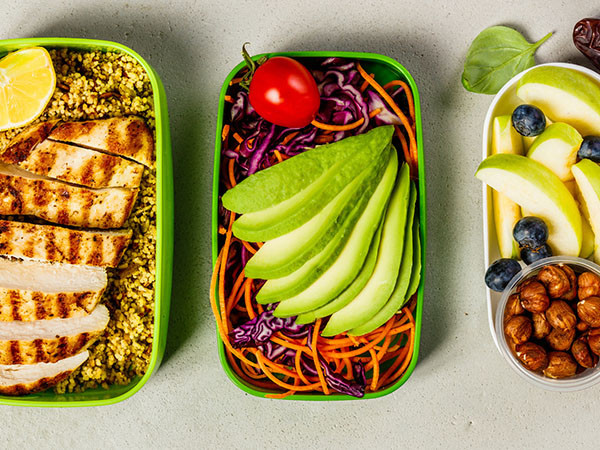
New thinking about plaque in arteries that feed the brain

Want to prevent shifting teeth? Maybe you need retainers

What you need to know about the new dietary guidelines

Food that’s healthier for people and planet can be cheaper, too

New evidence that polyphenol-rich foods help the heart

8 simple ways to reduce ultra-processed foods in your diet

How to curb your stress eating

How to spot Parkinson’s disease symptoms

Heart failure symptoms in women: How they’re different

GERD diet: Foods to avoid to reduce acid reflux
Nutrition Archive
Articles
Make fast food a smidge healthier: Swap out sugary drinks and fatty, salty sides
News briefs
Want to make fast food a little bit healthier? The key might be to make changes when you order a combination meal (like a burger, fries, and a drink), Harvard researchers suggest. Their study, published in the September 2019 American Journal of Preventive Medicine, found that combo meals far exceed guidelines for healthy eating, typically providing twice the recommended amount per meal for calories and sodium. Scientists analyzed the nutritional information of combination meals at 34 fast-food and fast-casual restaurants, and found that the average combo meal as advertised had about 1,200 calories, 14 grams of saturated fat, 2,100 milligrams of salt, and 68 grams of sugar. Those numbers dropped dramatically when low-calorie options were substituted for high-calorie choices — for instance, removing topping or dipping sauces, ordering small fries instead of large, and replacing sugar-containing soda with a zero-calorie drink. In that case, the average combo meal had about 750 calories, 11 grams of saturated fat, 1,800 milligrams of salt, and 10 grams of sugar: a smidge healthier. Of course, a truly healthful diet involves generally avoiding fast food altogether. But if you're on the road with no alternatives, order healthier drinks and sides.
Image: TheCrimsonMonkey/Getty Images
Healthy meals: 3 easy steps to success
Comfort food without the guilt
Simple swaps like whole grains instead of white rice maintain flavor while boosting health benefits.
There's nothing quite like coming in from the cold and sitting down to a hot, hearty meal. The icy temperatures seem to make us yearn for foods that will warm us up inside, stick to our bones, and soothe the soul. "We are warm-bodied creatures, and as the weather cools we actually crave more calories so we can stay warm," explains Sandra Allonen, a registered dietitian with Harvard-affiliated Beth Israel Deaconess Hospital.
But digging into comfort foods all winter — like a savory beef stew, spicy spaghetti and meatballs, macaroni and cheese, fluffy pancakes, gooey pizza, or buttery mashed potatoes — comes with health risks.
Menu alert: U.S. restaurants are offering more sugary drinks
News briefs
Sugary drinks are becoming more plentiful at large restaurant chains, and some drinks are getting sweeter. That's according to a study published in the August issue of the American Journal of Preventive Medicine. Harvard researchers analyzed the beverage offerings of 63 fast-food, fast-casual, or full-service restaurant chains from 2012 to 2017. Over that period, the number of sugary beverages available at the restaurants increased by 82%. Among newly introduced sugary beverages such as sodas, fruit drinks, and sports drinks, from 2012 to 2016 the number of calories per drink increased by about 50, and the average amount of sugar per drink reached a whopping 63 grams. Newly introduced sweetened teas roughly doubled in sugar and calories from 2012 to 2016, jumping from an average of about 140 calories per drink to about 300, and from 25 grams of sugar to 56. But remember: the American Heart Association recommends limiting added sugar to 25 grams per day for women and 36 grams per day for men. If you want to splurge on a sugary drink, try not to consume all of it, or chose a lower-sugar option.
Image: LiliGraphie/Getty Images
Cafeteria strategies that may improve your diet
News briefs
Red light, green light — we all know what those mean. And when Harvard researchers added traffic-light symbols to packages and menus in a hospital cafeteria, they found that diners bought healthier foods with fewer calories. The findings were published online July 10, 2019, by JAMA Network Open. Scientists first tracked the cafeteria purchases of hospital employees for a few months. Then they labeled foods with symbols indicating if a food was healthy (green), less healthy (yellow), or unhealthy (red); moved unhealthy foods to less accessible locations in the cafeteria; and tracked purchases for another two years. About 5,700 people bought food during that time. When researchers linked calorie information to purchases, they found a 6% decrease in calories per purchase over two years, including a 23% decrease in calories from the least healthy foods. This builds on previous research that found sales of red-stickered items dropped by 4% and sales of green-stickered items grew by 5% during the study. Can you try this at home? Maybe not the traffic-light stickers. "But making it harder to access unhealthy foods gives you enough time to think about your choice before eating something that is not consistent with your goals," says lead author Dr. Anne Thorndike, who specializes in obesity treatment and prevention at Harvard-affiliated Massachusetts General Hospital. "Strategies include having a drawer for the unhealthy foods, placing unhealthy snacks high on a shelf, and having a goto' shelf for healthy snacks."
Image: lcs813/Getty Images
The right way to "do lunch"
Smart choices for your midday meal may help set the stage for healthier eating throughout the day.
The classic American lunch — a deli sandwich, potato chips, and a soda — isn't exactly heart-friendly fare. Even salad bars can be tricky to navigate when you're trying to choose a nutritious but satisfying lunch. In fact, more than half of employed Americans who usually eat lunch on the job find it hard to eat a healthy lunch, according to a recent survey from the American Heart Association.
"Helping people understand what makes a healthy lunch may help them eat fewer calories and maybe even inspire them to make healthier food decisions the rest of the day," says Dr. Anne Thorndike, associate professor of medicine at Harvard Medical School. In a study of nearly 5,700 hospital employees, she and colleagues found that labeling cafeteria foods with simple "traffic light" symbols that reflected their relative health value was linked to healthier choices by employees. They ate fewer calories, mostly by eating fewer high-fat, high-calorie "red light" foods and more "green light" foods (in which the main ingredient was fruit, vegetable, whole grain, lean protein, or low-fat dairy). What's more, these dietary shifts lasted over a period of two years. For employees who visited the cafeteria most frequently, the estimated drop in calories could translate to a weight loss of up to 4.4 pounds over time, says Dr. Thorndike. The study was published July 10 in JAMA Network Open.
Legume of the month: Peas
When you were a kid, you may have lumped peas into the same category as broccoli, spinach, or any other green plant on the plate. But green peas aren't the same as leafy greens. In fact, their classification is a little tricky.
Mature green peas — typically sold dried and split in half — are more like beans. But fresh or frozen green peas are classified as a starchy vegetable by the U.S. Dietary Guidelines.
Problems with bloating? Watch your sodium intake
In the journals
If you suffer from regular bloating after eating, you may want to check your sodium intake, suggests a study published in July 2019 in The American Journal of Gastroenterology.
Scientists analyzed data from the Dietary Approaches to Stop Hypertension–Sodium trial (DASH-Sodium) from two decades ago. The original study compared the DASH diet — a high-fiber diet low in fat and high in fruits, nuts, and vegetables — against a low-fiber control diet. The study also looked at sodium intake as the participants consumed both high- and low-sodium versions of their diets. The study primarily focused on how dietary sodium affected blood pressure.
Cutting 300 daily calories improves several health markers
In the journals
Reducing your daily calorie intake by about 300 can improve the numbers for several health markers, according to a study published online July 11, 2019, by The Lancet Diabetes & Endocrinology.
Researchers recruited 218 adults with a body mass index of 22 to 27.9, which is in the range of normal weight and slightly overweight. For a month, half the participants ate three meals a day that reflected about a 25% reduction in their normal daily calorie intake. They also engaged in six months of group and individual counseling sessions. People in the other group continued their usual diet.
The trouble with excess salt
Sodium doesn't affect everyone equally, but there's good reason to stick to moderate amounts in your diet.
On average, Americans eat too much salt — more than a teaspoon and a half a day. Most often it doesn't come out of a shaker, but is hidden in the foods you eat. But is it really bad for your heart to eat too much, or is that just a concern for people with certain risk factors? There's been some debate on this topic, even among members of the scientific community. We asked Nancy Cook, a professor of medicine at Harvard Medical School, for her thoughts on salt — or more precisely, sodium, a mineral that makes up 40% of salt — and how it affects your health and your heart.
Is salt really bad for your heart?
"There is a fairly undisputed effect of sodium on blood pressure," says Cook. The effect is stronger in people with high blood pressure (hypertension), a sustained blood pressure reading of 120/80 or higher. The data for an effect on cardiovascular disease are somewhat more controversial, she says, but in general, the bulk of research does seem to link lower sodium intake with both lower blood pressure and a lower risk of cardiovascular disease.

New thinking about plaque in arteries that feed the brain

Want to prevent shifting teeth? Maybe you need retainers

What you need to know about the new dietary guidelines

Food that’s healthier for people and planet can be cheaper, too

New evidence that polyphenol-rich foods help the heart

8 simple ways to reduce ultra-processed foods in your diet

How to curb your stress eating

How to spot Parkinson’s disease symptoms

Heart failure symptoms in women: How they’re different

GERD diet: Foods to avoid to reduce acid reflux
Free Healthbeat Signup
Get the latest in health news delivered to your inbox!
Sign Up









